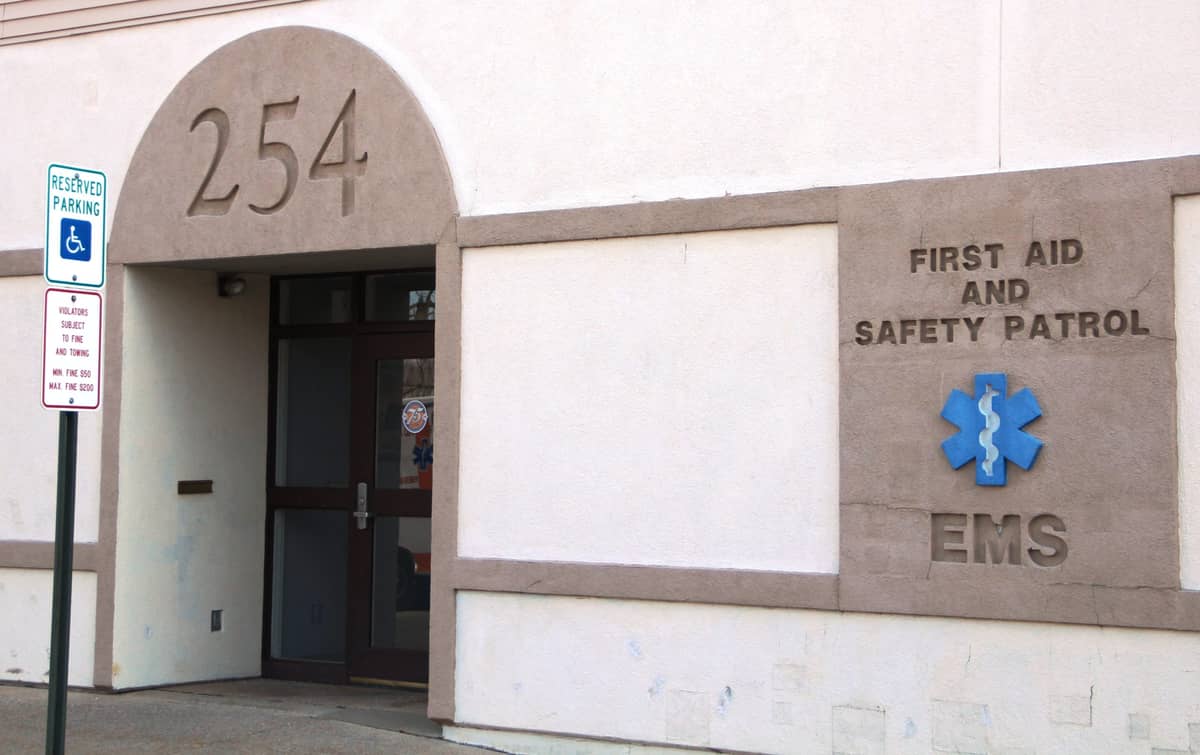Lebanon’s First Aid and Safety Patrol (FASP) has rebounded from a financial crisis and begun to turn a corner.
Gregg Smith, who began as business director in the latter half of 2019, deserves credit for much of that improvement, but he’s the first to note that the organization is also benefitting from changes that were put into place before he took the organization’s top financial role.
It’s proof of that classic wisdom: There are some things we can control, and others that are beyond our control.
A year-and-a-half ago, FASP, Lebanon County’s largest provider of ambulatory services, faced a financial crisis that threatened some of its 130 employees’ paychecks. But continuing into Smith’s currently five-month reign as business director, FASP has started to rebound and there’s now hope on the horizon.
“I’d say it’s a result of both,” said Smith. “I’m reaping some of the benefits from things that [former executive director] Bryan (Smith, no relation) put into place. I was a huge proponent of the up-staffing and the logistics center. The board of supervisors was already getting involved.
“Winning feels good,” continued Smith. “I didn’t come here to lose. We’re local, we are here, and we are committed to the success of FASP. I’m proud, and I’m trying to re-instill that pride.”

In the early months of 2018, FASP faced financial difficulties stemming from its decision to outsource billing invoices to a Berks County firm. At the time, FASP was that firm’s largest client, the transition was slow, and before the kinks could be ironed out, it placed a strain on FASP’s financial reserves.
In August of 2019, Bryan Smith left FASP to become the executive director at Lebanon County Christian Ministries. His former duties were split between Gregg Smith, the new business director, and Kara Summers, the new chief of operations.
“Bryan Smith had us headed in the right direction. He started the ball rolling,” said Smith, who’s been with FASP in varying roles for 24 years. “I knock on wood when I say ‘turnaround’ because I think we’re going to jinx ourselves. No matter how much we turn it around, we need community support to make it happen.”
The organization, Smith said, still needs donations.
“I think we’ve made it. We can take a breath, but we can’t leave our guard down. This year, we’re going to be continuing on the same path,” he said. “When you’re losing $1 million a year to non-payment, it makes it tough. But that’s the world we live in.”
FASP executed a number of maneuvers to get itself back on track.
Instead of downsizing its staff, FASP hired more people, and its administration, paramedics, emergency medical technicians, wheelchair technicians and logistical specialists remained loyal to the mission. It reinvented the everyday workings of its logistical center and the members of its board of supervisors became increasingly hands-on.
FASP’s ongoing partnership with WellSpan Health helped, as did the division of Bryan Smith’s former duties. Eventually, FASP’s difficulties with its outsourced billing began to work themselves out.
“My focus here is the entire business end of it, fixing it and making it better,” said Smith. “The operation is a team approach. We’ve very much grown as a team. You put smart people in key roles and then you get out of their way.”
If you try to do everything yourself, Smith said, you’re not going to do anything well. He’s learned to delegate.
“You have to give our people credit,” added Smith. “Some people bailed, but most did not. They bought into our vision and they’ve been patient. They understand we have to become financially independent ourselves. The recruitment rate and retention piece with paramedics and EMTs is difficult because of the rate of pay, but they believed in us. There’d be no recovery if they hadn’t bought into our vision.”

FASP is a 501(c)(3) nonprofit organization with an annual operating budget around $7 million. It maintains a constant emergency readiness, 24 hours a day, 365 days a year.
Smith estimated that it costs FASP about $600,000 a year to staff a two-technician ambulance crew, just in labor alone. Some 42 percent of FASP’s reimbursements come from emergency calls and about 58 percent come from non-emergency calls – half of which are wheelchair transports.
FASP doesn’t have the option of not responding, Smith said.
“We must respond and transport, whether a person has an ability to pay or not. We’re not compensated at the rate it costs us. We’re providing a service and we’re at the mercy of compensation schemes,” he said. “That’s what makes an EMT organization so difficult.”
FASP may be a nonprofit, but they still have to pay the bills, Smith said. While money may be tight, FASP still hired 18 new employees in December.
“That sounds counter-intuitive. Why would that help a turnaround? We were missing calls. We weren’t covering our jurisdiction. We were spreading our staff too thin. If you don’t provide services you don’t get the revenue,” he said. “We were in this vicious cycle. We were leaving money on the table. It made us successful, got us off our knees, and allowed us to be able to stand again.”

In 2019, FASP responded to nearly 12,000 emergency calls in 26 municipalities, mostly in Lebanon County. It also made about 6,000 non-emergency runs in the area.
“In my 24 years here, what I’ve come to realize is that culture attracts people,” said Smith. “They have to believe in the organization. They’re here for the mission. They’re dedicated to the mission. It’s not about the money. That’s the nature of a 501(c)(3).”
Good karma, he said, follows good customer service. The organization never says “no”—they want more business.
“With the 24-hour-a-day logistic center, we knew everybody was working hard. But we had to work harder and smarter,” he said. “If you do it right on the front end, you’ll get paid on the back end.”
FASP has been serving the city of Lebanon and surrounding areas for 82 years. It was originally formed in 1938 as a way of caring for the members of the Lebanon City Fire Department, then expanded into the community before eventually employing paid staff.
“When I took over in August, we were facing a situation where we had staff leave,” said Smith. “We were short-staffed, which is a killer for morale. I can remember being called into the office and being told I might not get a paycheck. Who wants to work for an organization like that?”
But now, things are different.
“Right now, we’re strong enough to treat our vendors well. We pay our bills on time. We’re very disciplined about not incurring further debt,” Smith said. “Ten years ago, we had seven people on the leadership team. Today we have five, even though our call volume has increased. We trimmed the fat. We took a good hard look at ourselves internally. We’re as lean and mean as we can be right now.”
Trust in people and the process, and good things will happen.
Do you know a Lebanon County organization with an interesting story to share? Give us advice on what to feature next!
Give the gift of local journalism.
If you are thankful for what LebTown brings to the community, consider joining our cause as a member. Members get an inside look at our publishing schedule each week, plus invites to our members-only Facebook group and happy hours.
Sign up for an annual membership using the link below, and we’ll give you a free LebTown mug at the next happy hour.
Learn more and join now here.
Full Disclosure: WellSpan Health is an advertiser on LebTown. LebTown does not make editorial decisions based on advertising relationships and advertisers do not receive special editorial treatment. Learn more about advertising with LebTown here.























